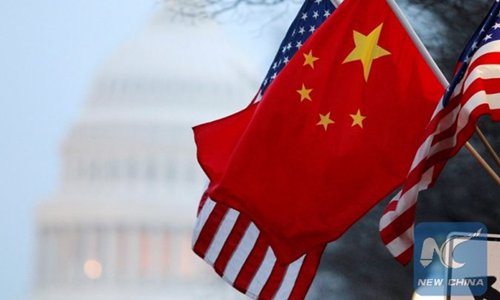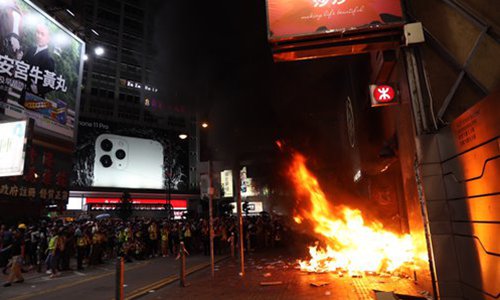HOME >> CHINA
China warns of countermeasures to US bill on HK
By Yang Sheng, Wang Wenwen in Beijing and Wang Cong, Zhao Juecheng in Hong Kong Source:Global Times Published: 2019/10/16 11:35:23
Hong Kong Human Rights and Democracy Act moves closer to becoming law

Photo:Xinhua
China warned of effective countermeasures after the US House of Representatives approved legislation that authorizes the US government to launch diplomatic action and economic sanctions against officials and law-enforcement personnel from China's Hong Kong Special Administrative Region (HKSAR).
The House on Tuesday backed the so-called Hong Kong Human Rights and Democracy Act of 2019, moving it one step closer to becoming law.
Aside from being condemned by authorities of China, the US move was also criticized by Hong Kong lawmakers, legal professionals and scholars from the mainland and Hong Kong.
Some experts suggested that China should prepare for countermeasures if the bill eventually becomes law, including sanctions against institutions and US officials who act inappropriately on Hong Kong-related issues, as well as a ban on US politicians who back the bill from traveling Hong Kong and the mainland, and an investigation of their business interests in China.
National People's Congress Foreign Affairs Committee strongly condemned and firmly opposed the US House of Representatives after the later passed the act, for serving its real intent of containing China and inciting troubles in Hong Kong, on the pretext of "human rights and democracy." It also slammed the lower house of the US Congress for paying a blind eye to the acts of criminality inflicted by radical anti-government activists and rioters.
Chief Executive Carrie Lam Cheng Yuet-ngor said at a press conference on Wednesday after she delivered the 2019 policy address that "We don't need other countries to tell us what human rights, democracy or freedom is. These are core values of Hong Kong that we are making efforts to safeguard."
US indulging violence
Stanley Ng Chau-pei, chairman of the Hong Kong Federation of Trade Unions, said that passing the act shows that some US politicians want to use human rights and democracy as tools to indulge violence, encourage separatism and create hatred in Hong Kong.
Hong Kong legislator Junius Ho Kwan-yiu on Wednesday blasted the US House for passing the bill, calling the move a double standard and flagrant interference in Hong Kong affairs, and that it supports violence and is in contempt of HK laws and courts.
Tian Feilong, an associate professor at Beihang University in Beijing and a Hong Kong studies expert, said that this is not a surprise to China, and whether the act is passed or not, it has no international legal basis because it is a long-arm jurisdiction move based on US hegemony.
"What US politicians want is to keep the fire burning, and further meddle with the upcoming 2019 Hong Kong District Council elections, to support pro-US anti-government forces to gain political power in the city," he said.
China's Ministry of Foreign Affairs issued a statement on Wednesday, saying, the top issue for Hong Kong right now has nothing to do with human rights or democracy, but to stop violence and restore public order and safeguard the rule of law
The US ignored the fact that the violence committed by the anti-government protesters is escalating, Gu Min-kang, director of the Chinese Association Hong Kong and Macao Studies and former deputy president of the School of Law of the City University of Hong Kong, told the Global Times on Wednesday.
The move shows that the US is increasing its support for the opposition in Hong Kong in an attempt to further cause chaos in Hong Kong, Gu said.
Lawrence Ma, a barrister and chairman of the Hong Kong Legal Exchange Foundation, told the Global Times that it is just a political red herring. "No legal significance to be concerned about," he added.

Rioters set fire at Causeway Bay in Hong Kong, south China, Oct. 4, 2019 Photo: Xinhua
Draconian measures
"Regarding the wrong decision of the US, China will surely take effective countermeasures to firmly safeguard its sovereignty, security, and development interests," the foreign ministry said.
"The US also has interests in Hong Kong. If the bill becomes law, it would not only hurt China's interests and China-US relations, but US interests as well," the ministry warned.
Gu called on the HKSAR government to implement more draconian measures, such as banning some foreign officials and politicians who support or even create turmoils in Hong Kong from entering the city.
Tian said the Central Government of China and the HKSAR government can act jointly to ban US politicians and officials who back the bill from entering Hong Kong and the mainland, and to sanction and investigate their business interests in China.
In October, US Senators, including Josh Hawley and Ted Cruz, visited Hong Kong and met anti-government forces to support the lengthy turmoil which is hurting the city. Other US politicians like House Speaker Nancy Pelosi and Senator Marco Rubio have frequently voiced support for the radical protests and protesters.
Tian noted that the Chinese government also needs to provide protection and assistance to HKSAR officials affected by the US bill.
Playing 'old tricks'
"We urge the relevant US politicians to immediately stop advancing the bill and stop interfering in Hong Kong affairs," and "playing the 'Hong Kong card' will not succeed as it only means lifting a rock only to drop it on one's own feet," said the Commissioner's Office of China's Ministry of Foreign Affairs in Hong Kong on its website on Wednesday.
"What makes you [US lawmakers] think you are qualified to lecture a region that ranked higher than the US, whether on the level of freedom or the rule of law? US police shot and killed about 1,000 people in 2017, but you never questioned this, and now, you dare criticize and accuse the Hong Kong Police Force's restrained law-enforcement," said the statement released on the office website, adding "if this is not double standard, then what is it?"
Kennedy Wong Ying-ho, solicitor of the Supreme Court of Hong Kong, told the Global Times that the US is unqualified to interfere in Hong Kong affairs, and it is playing an old trick to interfere in other countries' internal affairs with excuses like "democracy," "human rights" and "freedom."
The political elites of the US have reached a consensus to contain China and interfere in China's internal affairs, so the US Senate will likely pass the act as well, and the US President will sign it, Wong noted.
Ma suggested that if the act becomes law, people affected by it could challenge the act's validity and constitutionality in a US court.
Xu Keyue contributed to this story
Newspaper headline: China rebukes bill on HK
Posted in: HK/MACAO/TAIWAN